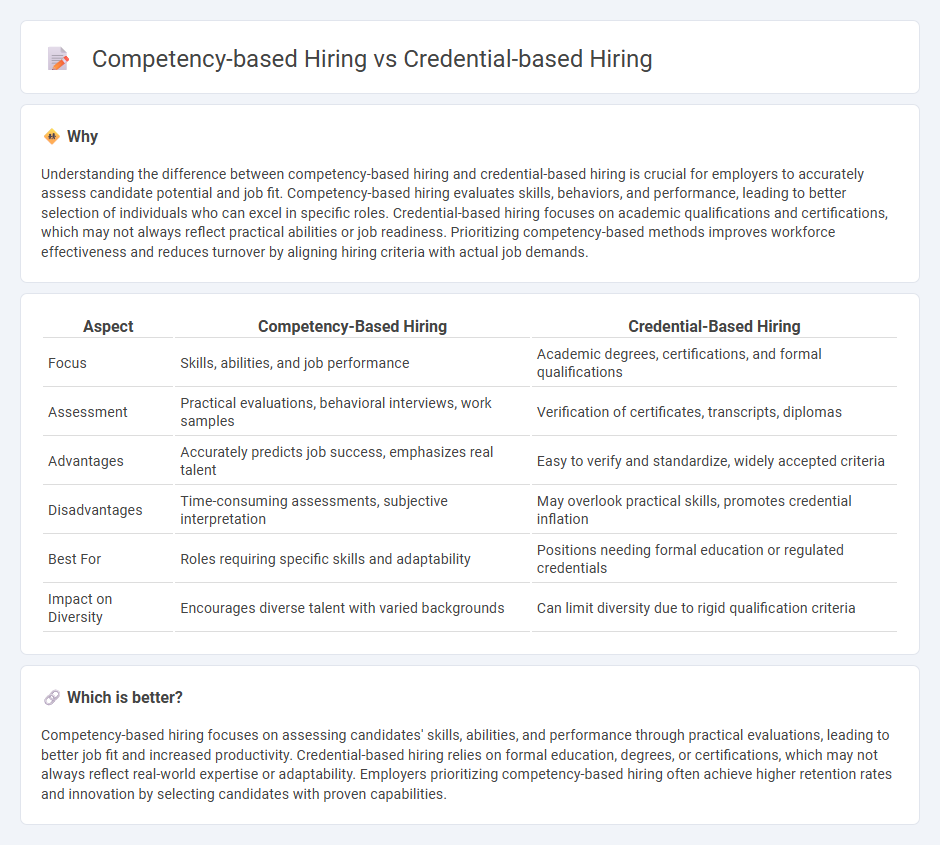
Competency-based hiring evaluates candidates based on demonstrated skills and practical experience, ensuring alignment with specific job requirements and enhancing workforce productivity. Credential-based hiring prioritizes educational qualifications and certifications as indicators of potential, often relying on formal academic achievements. Explore how these hiring strategies impact talent acquisition and organizational success.
Why it is important
Understanding the difference between competency-based hiring and credential-based hiring is crucial for employers to accurately assess candidate potential and job fit. Competency-based hiring evaluates skills, behaviors, and performance, leading to better selection of individuals who can excel in specific roles. Credential-based hiring focuses on academic qualifications and certifications, which may not always reflect practical abilities or job readiness. Prioritizing competency-based methods improves workforce effectiveness and reduces turnover by aligning hiring criteria with actual job demands.
Comparison Table
| Aspect | Competency-Based Hiring | Credential-Based Hiring |
|---|---|---|
| Focus | Skills, abilities, and job performance | Academic degrees, certifications, and formal qualifications |
| Assessment | Practical evaluations, behavioral interviews, work samples | Verification of certificates, transcripts, diplomas |
| Advantages | Accurately predicts job success, emphasizes real talent | Easy to verify and standardize, widely accepted criteria |
| Disadvantages | Time-consuming assessments, subjective interpretation | May overlook practical skills, promotes credential inflation |
| Best For | Roles requiring specific skills and adaptability | Positions needing formal education or regulated credentials |
| Impact on Diversity | Encourages diverse talent with varied backgrounds | Can limit diversity due to rigid qualification criteria |
Which is better?
Competency-based hiring focuses on assessing candidates' skills, abilities, and performance through practical evaluations, leading to better job fit and increased productivity. Credential-based hiring relies on formal education, degrees, or certifications, which may not always reflect real-world expertise or adaptability. Employers prioritizing competency-based hiring often achieve higher retention rates and innovation by selecting candidates with proven capabilities.
Connection
Competency-based hiring and credential-based hiring are connected through their focus on assessing candidate qualifications to match job requirements effectively. While competency-based hiring evaluates specific skills, abilities, and performance indicators directly related to work tasks, credential-based hiring relies on formal qualifications and certifications as benchmarks of potential capability. Together, they create a comprehensive hiring strategy that balances practical competency with proven educational or professional credentials.
Key Terms
Qualifications
Credential-based hiring emphasizes formal degrees and certifications as primary qualifications, often prioritizing educational background over practical skills. Competency-based hiring evaluates candidates on demonstrable skills, experience, and performance relevant to the job, enabling a more accurate prediction of success. Explore deeper insights into how these approaches impact talent acquisition strategies.
Skills Assessment
Credential-based hiring emphasizes academic degrees and certifications as primary indicators of candidate qualifications, often overlooking practical skills. Competency-based hiring prioritizes skills assessment, evaluating candidates through tests, simulations, or real-world tasks that directly measure job-relevant abilities. Explore detailed comparisons and best practices in skills assessment to optimize your hiring strategy.
Job Performance
Credential-based hiring prioritizes academic degrees and certifications as primary indicators of candidate qualifications, often overlooking practical skills and experience. Competency-based hiring evaluates candidates on demonstrated abilities, behaviors, and past job performance linked directly to role requirements, which correlates more closely with future success and productivity. Explore how shifting to competency-based hiring can enhance organizational effectiveness and employee performance.
Source and External Links
Skills-Based Hiring: The Life of a Credential - Credential-based hiring traditionally focuses on education and past jobs, but evolving to skills-based hiring uses digital credentials that clearly link skills to job requirements, offering a fuller, more transparent view of a candidate's readiness beyond traditional resumes and degrees.
Skills-Based Hiring: Why It's Time to Rethink Hiring - Credential-based hiring often relies on degrees and job titles, but shifting focus to verified skills expands talent pools, improves diversity, and leads to better hires, with 90% of companies reporting improved outcomes when hiring based on skills rather than credentials.
Skills Based Hiring: Why states & employers must act now ... - Effective credential-based hiring requires common, recognizable validation of skills through quality-assured credentials like certificates and industry certifications, helping employers and workers identify and trust skill competencies aligned with occupational requirements.
 dowidth.com
dowidth.com